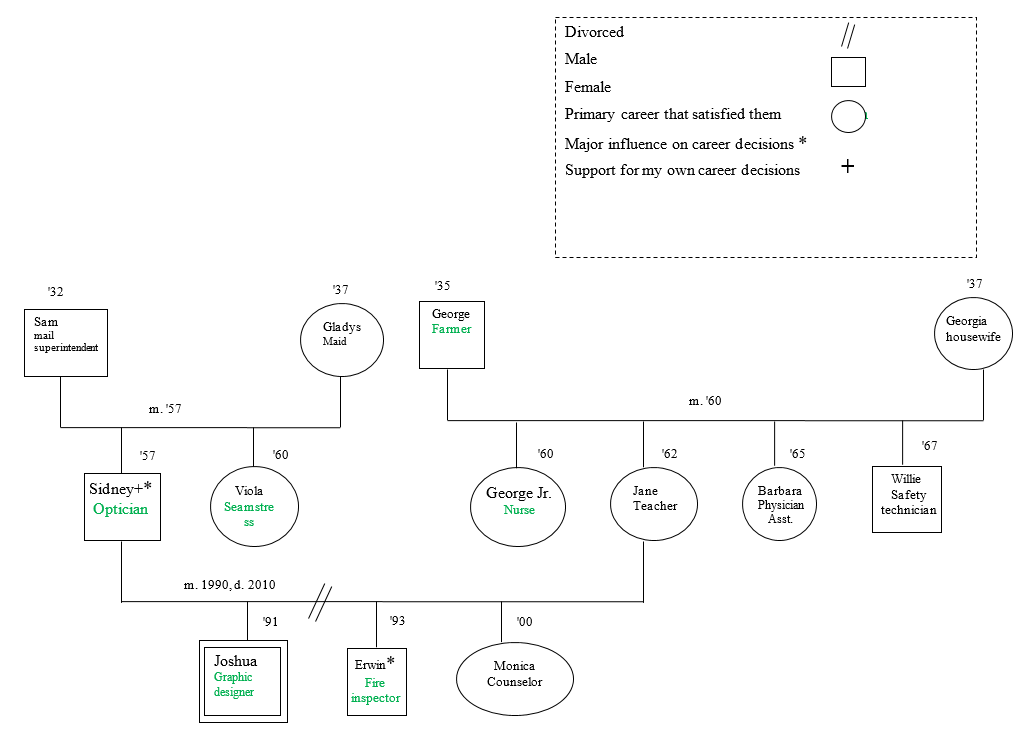The number of roles family members are expected to carry out depends on their marital, parental status, and gender. For instance, parents are expected to maintain and manage the family system. Gendered expectations strongly influence my family; consequently, instrumental roles are assigned to both men and women, while women also engage in affective roles.
Yet, all family members provide resources. Although there were no open discussions about my family’s expectations of my work, career, and life, I received these messages indirectly. The contradiction between my relatives’ expectations and my desires is a major life and career theme. My family has always been involved in my life, particularly in career-related matters. For instance, my grandparents constantly encouraged the development of overtly utilitarian skills. As a result, I had to find a way to combine my family’s expectations and preferences. The search for opportunities to self-actualize is another significant theme, as well as the need to escape the parent’s home. College was a fundamental step in becoming closer to completing these themes.
Such variables as gender, religion, tradition, and socioeconomic status have strongly impacted career choices and the development of my mother’s side of the family. Traditional gender roles and expectations, to a significant degree, predetermined the career choices of my maternal aunts and uncle. This tendency was amplified by Christianity and the deep religiosity of my grandparents. Additionally, my mother’s and her siblings’ professions were expected to align with my maternal grandparents’ expectations and reflect their social status. My father’s part of the family is significantly less driven by traditional roles and beliefs, which allowed me and my siblings to be more unconfined in our careers.

The value of higher education is a prominent theme: my maternal grandparents viewed it not as optional but as an indispensable attribute to succeed and become what they believed to be a valuable member of society. Career choices were also expected to be practical, guided by reason, and not personal inclinations. Although my father’s and mother’s sides of the family are distinct in this respect, the value of strong work ethics was constantly accentuated. For instance, work has always occupied a sizeable part of my parents’ lives, sometimes at the expense of family.
Multigenerational family decision-making patterns are pronounced in the career genogram. A strong preference for practical occupations can be observed among the three generations with almost no variations. Particularly, job choices in the health care system seem to be the most common in the second generation, while manual jobs are typical for the first generation. The preference is not based on traditional gender expectations, as it concerns both male and female family members. A slight predisposition for manual labor jobs is also present in several cases. The extensive involvement of parents in the decision-making process is also tangible. In general, pragmatism and dependability are the most prominent patterns.
The career genogram crystallizes an “acceptable” range of life and career roles. Thus, rules on my mother’s side of the family exclude the option of choosing humanities, social sciences, or arts as the primary educational branches and consequently limiting employment possibilities. Gendered expectations also regulate career roles: manual jobs are strictly reserved for the family’s male members, while more people-oriented ones are more typical for the family’s women. On the other hand, location does not appear to be a significant criterion since the three generations do not live in close proximity.
Beyond the generational information covered in the genogram, it is known that some career patterns extend beyond the three generations. For instance, even though my maternal grandmother is the only housewife in the genogram, this occupation was more common among older generations. Multiple women on both sides of my family were primarily occupied with maintaining and managing the family system in the beginning and even middle of the last century. Similarly, career choices were more limited and necessitated vocational training resulting in manual labor. Such employment choices as team assemblers or construction workers are more rarely encountered in the last three generations.
The women’s liberation movement that began in the middle of the last century influenced my family’s career choices significantly. The movement targeted professional inequality, fighting for equal access to work opportunities (Schulz, 2017). As a result, women became able not only to enter male-dominated fields, but the perception of the role of a career in a women’s life also altered (Schulz, 2017). From my perspective, this social change allowed my mother and aunts to dedicate themselves to their professional development.
The process of creating the genogram was beneficial for understanding the overarching themes of my life. The analysis allowed me to concretize ideas about my family’s attitudes and career patterns. Furthermore, to complete the assignment, I had to contact my parents and relatives since extensive knowledge of one’s family history was indispensable for creating a genogram. This communication helped me to understand better my family’s motives. Although completing the assignment entails uncovering family disagreements and conflicts, ultimately, it facilitates reconciliation and healing.
Reference
Schulz, K. (2017). The women’s liberation movement: Impacts and outcomes. Berghahn.